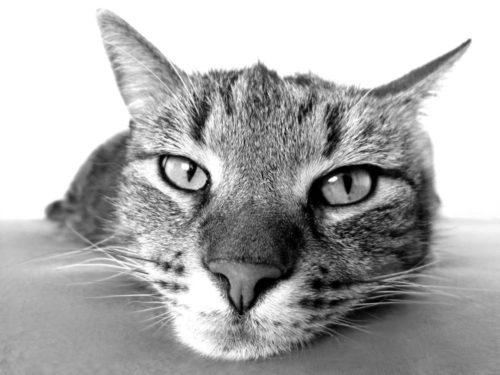
Arthritis is a chronic condition caused when the normal joint tissues degenerate (or wear away), leading to pain and ongoing damage.
Arthritis commonly develops in middle age, with older cats more likely to demonstrate signs of arthritis. Arthritis in our pets is sadly very common. Around 40% of all cats will show signs of arthritis and more than 90% of cats older that 12 years have signs consistent with arthritis when looking at x-rays of their joints. If left untreated, the pain will become worse over time.
Despite how common arthritis is in cats, it is underdiagnosed. Globally, only around 13% of cats with arthritis will receive a diagnosis and therefore, treatment for their chronic pain. So why is this number so low?
The nature of cat behaviour means they tend to hide signs of illness or pain. In the wild, showing signs of illness would make them vulnerable to predation from other animals and this behaviour has carried over to our pet cats. Whilst beneficial in the wild, this is not helpful in a home environment. It means that illnesses can be well advanced before we notice anything is wrong. Another reason why arthritis in cats is not easy to spot, is due to the common misconception that slowing down or being less active is a normal change as cats get older. This is not the case. If you cat becomes less active, shows less interest in or a reluctance to play, this could be a sign that your cat is suffering from arthritis.
However, if we are aware of the behaviours (or lack thereof) associated with arthritis in cats, we can spot the signs earlier, meaning we can ensure our cats are comfortable, more mobile and have a good quality of life.
Mobility:
Your cat may be reluctant to
• Jump up or down onto or off of surfaces
• Go up and/or down stairs
• Jump or climb into/onto their favourite bed
• Play
• Use scratching posts (or other substrates)
Behaviour:
Your cat may be
• Grumpy or less happy with people and other animals in the house
• More withdrawn – interacting less with others in the house
• Less active
• Sleeping in different locations e.g., on the floor
• Not coming upstairs/into the house any more
If you are unsure as to whether your cat may have arthritis pain, you can complete this simple checklist.
If you notice any of these signs in your cat, it could indicate they have pain associated with arthritis. To book your cat in for a check-up give us a call on 01803 606059 (Torquay) or 843836 (Paignton), or book online.
In our next blog we will cover treatment and management of arthritis in cats.
